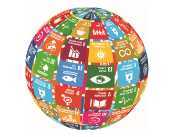
In February 2019, the EP Committee on Development (DEVE) and the Committee on Environment, Public Health and Food Safety (ENVI) held a joint public hearing to discuss strategic actions about the future of Europe, concerning the Sustainable Development Goals.
The two Committees have decided to cooperate to enhance the role of the European Parliament in promoting a more ambitious implementation of the 2030 Agenda. 2019 will be the year for the revision of the progress of the Sustainable Development Goals (SDGs) during the UN summit in September.
Looking back: some of the main steps towards SDGs
- In September 2015, the United Nations General Assembly has approved the Agenda 2030, an action plan for Sustainable Development focused on 17 Goals to be reached by 2030;
- In November 2016, the Commission has adopted a communication on "Next steps for a sustainable European future", a framework for the contribution of the European Union to the application of the Agenda 2030; the Commission has announced the launch of the EU's high-level multi-stakeholder platform which has a role in the follow-up and exchange of best practices about SDGs;
- In January 2019, the Commission has published the Reflection Paper “Towards a sustainable Europe by 2030", within the debate on the future of Europe.
Achieving a Sustainable Development strategy for Europe
The Hearing started with an introduction by the DEVE Chair Linda McAvan that focused on the importance of adopting a global strategy for Europe. The two Committees have jointly prepared a strategic report on SDGs implementation, that was then voted on February 27th and it will be adopted in the EP March Plenary. This report was developed as a response to the , document presented during the opening speech by Commission Vice-President Franz Timmermans who said (quot.) "Sustainable development starts and ends with people, it is about making our economy and society sustainable and prosperous at the same time... Europe can and should lead the way." The EU has become a frontrunner in the field of sustainability from the beginning, championing the Paris Climate Agreement and mainstreaming Sustainable Development priorities across its policies. The SDGs impact is relevant in every field of the Commission policies.
State of the art
The main section of the Hearing focused on the SDGs implementation mechanisms in Member States. After the analysis of the actions and the activities of National Parliaments, the condition of the governance policy in various States is reviewed through the presentation of some studies from Ingeborg Niestroy (Managing Director, Public Strategy for Sustainable Development) and Elisabeth Hege (Research Fellow, Institute for Sustainable Development and International Relations - IDDRI). From these studies it has become clear that only learning from the virtuous behaviors of Member States - for instance as Finland and Denmark, that have connected SDGs with their national budgets - we could proceed to an effective transition, based on an inter-parliamentary collaboration.
Presenting the Global Sustainable Development Report (GSDR), the Intergovernmental Panel on Climate Change (IPCC) Vice-Chair Jean-Pascal Van Ypersele, mentioned some results from the first quadrennial report about the achievement of the SDGs. Despite the actions undertaken, it appears that the EU is far from the targets set by the UN. A real transformation towards sustainable and resilient societies is needed as a result of synergies between various actors and strategies, starting from the local level but with a more global point of view.
Transformation and knowledge: SDGs, enterprises and Science towards a circular economy
Currently, enterprises and the overall business community seem more reactive to this transition than the political dimension. To engage the enterprises, funds will have to continue to be committed to Research and SDGs priorities (e.g. Horizon 2020, the biggest European Research and Innovation Framework Programme), to implement transparency and strict rules, durable in the long term. Dialogue and investments could continue modifying our economy from linear to circular. During the meeting, from the exchanges between Members and Academics, the importance of the great contribution that Science can bring to this transformation clearly emerged.
SDGs in the Future of Europe
From the beginning of the Hearing, Linda McAvan focused on the necessity of creating a global strategy based on concrete targets, ambitious benchmarks and planning a systematical and very clear monitoring that brings well-defined values (also through the identification of specific indexes).
During the Hearing, it is proposed an “extra-European point of view” on EU SDGs policy: in line with what was stated by Timmermans, Professor Jeffrey Sachs - a leading expert on sustainable development at Columbia University - has encouraged Europe to continue its leading role towards other international partners in this transition, in order to promptly achieve tangible benefits.
The Commission strategy should be shown as an invitation to other countries to begin a common policy based on participation that implies co-accountability between States, Civil Society and private sector in different sectors.
Therefore, six fundamental “transformations” were identified to reach the SDG targets, namely in the areas of Health, Education, clean and renewable Energy, Food production and Biosphere, (Smart) Cities and Information Technologies (via the digital revolution). These transformations will require coordination between different tools and policies, standardized transformations reached through a transnational network instead of self-managed changes: an actual pan-European governance of this process.
